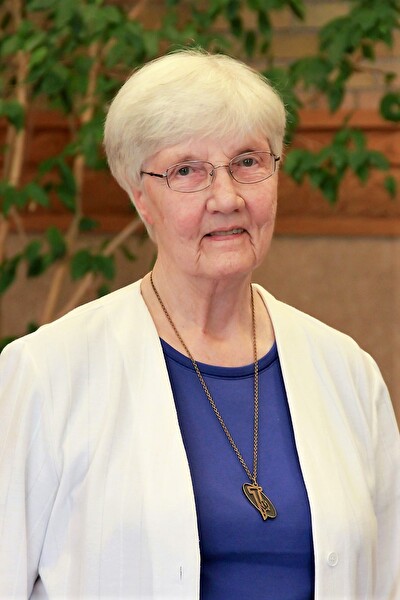 By Sister Elise Saggau, OSF
By Sister Elise Saggau, OSF
God wants to come close to us, very close. God does not want to instill fear in us. Therefore, God comes among us as one of us—as a little baby. Who can be afraid of a little baby? A baby is completely dependent on its parents, nurses and caregivers. God wants to become so powerless among us as to be unable to eat or drink, walk or talk, play or work without many people’s help. God becomes dependent on human beings in order to grow up and live among us and so proclaim the good news of what God is really like. God chooses to become powerless so that God’s own mission among us might be dependent on us. God becomes human and weak to break through the walls of oppressive power. That’s the story of Jesus; that’s the story of Christmas.
The great news of the Gospel is that God became small and vulnerable, and precisely in this way bore fruit among us. The most fruitful life ever lived is the life of Jesus, who did not cling to divine power but became as we are. Jesus came to us dependent on the care and protection of others. He lived among us as a poor teacher, without any political, economic or military power. He died as a useless criminal. In this extreme vulnerability our salvation was won.
It is very hard for us to grasp even a little bit of the mystery of God’s vulnerability. Yet, when we have eyes to see and ears to hear, we can know it in many ways and in many places. We perceive it when a child is born—the fruit of the love of two people who came together without defenses and embraced each other in weakness. We perceive it in the graceful smiles of many who are poor, ill or disabled. We perceive it every time people seek forgiveness and are reconciled. Christmas is the victory of humility over arrogance, of simplicity over complexity, of silence over clamor, of prayer over self-sufficiency.
Christmas announces joy for all people. The Christian Church is not a haven for sad, frightened and angry people. Its language is a language of joy and hope. It reaches out to those who are sad and invites them into joy. But not just any kind of joy. This joy consists of knowing that we are welcomed and loved by God unconditionally. The message is extremely simple. It can be understood by anyone. It untiringly proclaims that God has come, God is coming, and God will come to save us! It addresses those who are fearful, those who are weak, those who feel hopeless. To all of us who live in the shadow of death, God comes to strengthens us, to make us steadfast, to give us courage, to make the desert of our lives blossom—to give us joy.
When we feel joy, we invite others to take part in it. Christmas has a remarkable quality—its joy touches not only Christians but all who live in our societies, believers and unbelievers alike. Its joy is infectious. It moves people to generosity and a spirit of giving. By its nature, it is a time to remember that without Jesus there is no Christmas. Society may be celebrating a holiday, but unless Jesus is at the center of the celebration, it is not a Christmas holiday. And if Jesus is at the center, then all the trimmings, all the lights, all the sounds, all the traditions, including the characteristic foods—all contribute to creating an atmosphere of celebrating the life we have received, the salvation we have experienced. If we remove Jesus from this picture, the lights go out. Everything becomes superficial, illusory, even tiresome.
Christmas is an invitation. It beckons to us and bids us to seek out and find the true light. It reveals what God is really like and what we are really like. It identifies the true gift—God-come-among-us as one-of-us.

